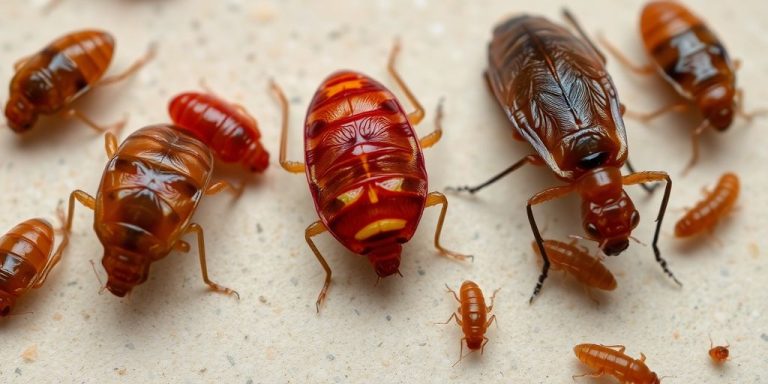If you’re dealing with termites, it’s important to understand how to manage these pests effectively. This guide will help you find local solutions for termite pest control near me, ensuring you can protect your home from these destructive insects. We’ll cover everything from termite behavior to local services and treatment options, making it easier for you to take action against an infestation.
Key Takeaways
- Learn about different types of termites and their habits.
- Spot the signs of a termite problem early on.
- Find reliable pest control services in your area.
- Compare various treatment methods to find the best fit.
- Take preventive steps to keep termites away in the future.
Understanding Termite Behavior and Risks

Termites are small insects that can cause big problems for your home. Understanding their behavior is key to preventing damage. There are several common types of termites, including:
- Subterranean termites
- Drywood termites
- Dampwood termites
Each type has its habits and risks.
Common Types of Termites in Your Area
Knowing the types of termites in your area can help you identify potential threats. For example, subterranean termites live underground and can enter homes through the soil. Drywood termites, on the other hand, can infest wood directly without needing contact with the ground.
Signs of Termite Infestation
Look for these signs to catch an infestation early:
- Mud tubes on walls or foundations
- Hollow-sounding wood
- Discarded wings near windows or doors
Potential Damage Caused by Termites
Termites can cause serious damage to your home. They can weaken wooden structures, leading to costly repairs. In fact, the average homeowner spends thousands of dollars on termite damage each year.
Regular inspections can help catch termite problems before they become serious.
By understanding termite behavior and risks, you can take steps to protect your home from these destructive pests. Remember, flatline pest control offers professional services to help keep your home safe from termites and other pests.
Identifying Local Termite Control Services

When dealing with termites, it’s crucial to find the right help. Researching local pest control companies can make a big difference in how effectively you deal with an infestation. Here are some steps to guide you:
Researching Pest Control Companies
- Look for local experts: Search for pest control services in your area. Check their websites and see what services they offer.
- Check qualifications: Ensure the companies are licensed and insured. This protects you in case of any issues.
- Ask for recommendations: Talk to friends or family who have dealt with termites before. They can share their experiences and suggest reliable services.
Questions to Ask Potential Providers
When you contact pest control companies, consider asking:
- What methods do you use for termite control?
- How long have you been in business?
- Can you provide references from past clients?
Evaluating Service Reviews and Testimonials
Reading reviews can help you make a better choice. Look for:
- Overall ratings: Check how many stars the company has on review sites.
- Customer feedback: Read what others say about their experiences. Positive comments about effectiveness and customer service are good signs.
- Response to complaints: See how the company handles negative reviews. A good company will address issues professionally.
Finding the right termite control service is essential for protecting your home. Take your time to research and ask questions to ensure you choose wisely.
Comparing Termite Treatment Options

Chemical Treatments and Their Effectiveness
Chemical treatments are one of the most common ways to deal with termites. They involve using pesticides that can kill termites on contact or through ingestion. These treatments can be very effective if applied correctly. Here are some key points to consider:
- Fast action against termites.
- Long-lasting protection when done right.
- Requires professional application for best results.
Eco-Friendly Termite Control Solutions
For those who prefer a more natural approach, eco-friendly termite control options are available. These methods are safer for the environment and your family. Some options include:
- Boric acid treatments.
- Nematodes, which are tiny worms that eat termites.
- Using orange oil, which can kill termites on contact.
DIY vs. Professional Termite Treatments
When it comes to termite control, you might wonder whether to tackle it yourself or hire a pro. Here’s a quick comparison:
| Aspect | DIY Treatments | Professional Treatments |
|---|---|---|
| Cost | Generally lower | Higher upfront cost |
| Effectiveness | Varies greatly | Highly effective |
| Time Required | Can be time-consuming | Quick and efficient |
| Safety | Risk of improper use | Trained professionals |
Choosing the right treatment is crucial for effective pest control. Make sure to weigh your options carefully before deciding.
Cost Considerations for Termite Control
Factors Influencing Treatment Costs
When it comes to termite control, several factors can affect the overall cost. Here are some key points to consider:
- Type of treatment: Different methods, such as chemical treatments or eco-friendly solutions, can vary in price.
- Extent of infestation: The more severe the infestation, the higher the cost for treatment.
- Location: Prices can differ based on your area and the availability of pest control services.
Budget-Friendly Pest Control Strategies
If you’re looking to save money on termite control, consider these strategies:
- Regular inspections: Catching an infestation early can save you money.
- DIY treatments: Some minor infestations can be handled with do-it-yourself methods.
- Compare quotes: Get estimates from multiple pest control companies to find the best deal.
Insurance and Warranty Options
Many pest control companies offer warranties or insurance options. Here’s what to keep in mind:
- Coverage: Check what is included in the warranty.
- Duration: Understand how long the coverage lasts.
- Cost: Factor in any additional costs for these options.
Remember, investing in termite control now can save you from costly repairs later. Don’t wait until it’s too late!
Preventive Measures to Avoid Future Infestations

Regular Home Inspections
To keep your home safe from termites, regular inspections are key. Check your home at least once a year for signs of termites. Look for mud tubes, discarded wings, or wood that sounds hollow when tapped.
Moisture Control and Home Maintenance
Termites love moisture, so it’s important to keep your home dry. Here are some tips:
- Fix leaky pipes and faucets.
- Ensure proper drainage around your home.
- Use dehumidifiers in damp areas like basements.
Landscaping Tips to Deter Termites
Your yard can also attract termites. To help keep them away, consider these landscaping tips:
- Keep wood piles away from your home.
- Trim trees and shrubs to allow sunlight in.
- Use mulch sparingly, as it can retain moisture.
Taking these steps can significantly reduce the chances of a termite infestation. Prevention is always better than cure!
Understanding Local Regulations and Permits
When dealing with termite control, it’s important to understand the local rules and permits that may apply. Each state has its own regulations regarding pest control, which can affect how treatments are carried out. Here are some key points to consider:
State and Local Pest Control Regulations
- Regulations can vary significantly from one area to another.
- Some states require pest control companies to be licensed.
- There may be specific guidelines on the types of chemicals that can be used.
Necessary Permits for Termite Treatments
- Certain treatments may require permits, especially if they involve chemicals.
- Homeowners should check with local authorities to ensure compliance.
- Failing to obtain necessary permits can lead to fines or ineffective treatments.
Compliance with Environmental Standards
- Pest control methods must often meet environmental safety standards.
- Companies should provide information on how they comply with these standards.
- Homeowners should ask about the environmental impact of the treatments used.
Understanding these regulations can help you make informed decisions about termite control. Always consult with local experts to ensure you are following the right procedures and protecting your home effectively.
Emergency Termite Control Solutions
Identifying Urgent Infestation Signs
When it comes to termites, quick action is crucial. Here are some signs that you might have an urgent infestation:
- Mud tubes on walls or foundations
- Hollow-sounding wood when tapped
- Discarded wings near windows or doors
Immediate Steps to Take Before Professional Help
If you suspect a termite problem, take these immediate steps:
- Seal off affected areas to prevent further damage.
- Remove any wood or cellulose materials near the infestation.
- Contact a pest control service as soon as possible.
Choosing Emergency Pest Control Services
When selecting a pest control service for emergencies, consider the following:
- Look for companies that offer 24/7 services.
- Check for certifications and licenses.
- Read reviews to ensure they have a good reputation.
Remember, acting fast can save your home from serious damage. Don’t wait too long to address a termite issue!
Final Thoughts on Local Termite Control
In conclusion, dealing with termites can be a big hassle, but you don’t have to face it alone. Finding the right pest control service near you is key to keeping your home safe. Remember to look for local experts who know how to handle termites effectively. They can help you spot the signs of an infestation early and provide the best solutions to get rid of them. By taking action quickly and choosing the right help, you can protect your home and enjoy peace of mind.
Frequently Asked Questions
What are termites and why are they a problem?
Termites are small insects that eat wood. They can cause a lot of damage to homes and buildings by chewing through wooden structures, which can be very expensive to fix.
How can I tell if I have termites in my home?
You might see signs like mud tubes on walls, discarded wings, or hollow-sounding wood. If you notice these, it’s a good idea to get a pest control expert to check for termites.
What types of termite treatments are available?
There are different ways to treat termites. Some treatments use chemicals, while others are more eco-friendly. You can also try some do-it-yourself methods, but professional help is often best.
How much does termite control cost?
The cost can vary a lot depending on how big the problem is and what kind of treatment you choose. It’s important to get quotes from different companies to find the best price.
How can I prevent termites from coming back?
To keep termites away, make sure to fix any leaks in your home, keep wood away from the ground, and have regular inspections. Good maintenance can help stop infestations.
What should I do if I find termites in my home?
If you find termites, act quickly! Call a pest control service to help you get rid of them. In the meantime, try to limit their access to wood and moisture.



